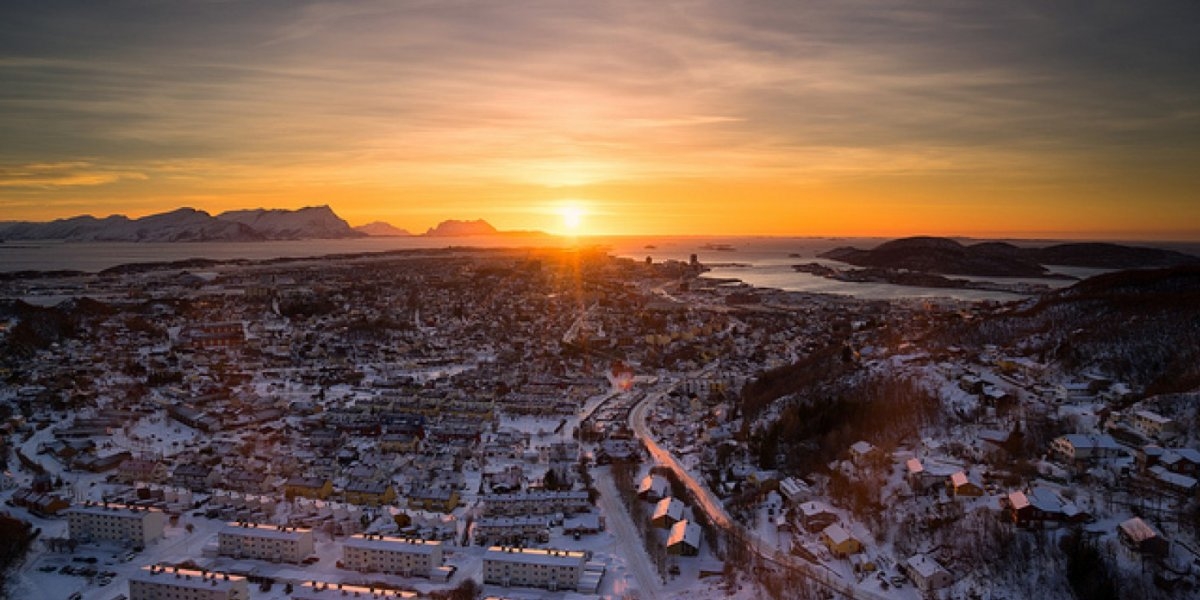BODØ. PHOTO: TROND KRISTIANSEN /FLICKR /CREATIVE COMMONS
What do youth from Bodø in Arctic Norway think about climate change?
Though we know much about what adults think of the global climate problem, little is known about what young people think about it. This is a snapshot of attitudes among youth in a medium sized Norwegian Arctic city.
Julia Bobina
How do young people understand climate change and the complex challenges that await us?
This is the question which I sought to answer in my Master’s thesis “Climate change in northern Norway: young people’s perceptions and engagement with climate change”, conducted as a part of a M.Sc. in Social Science at Nord University in Bodø.
The goal of this research was to explore opinions on the problem of climate change held by youth in the northern city of Bodø (Bodø is the largest city in Nordland county, and the second-largest in North Norway). The findings are based on 17 roughly one-hour interviews with youth between the ages of 18 and 27 selected from two high schools and the Nord university in Bodø.
Will it harm us?
The informants believe that climate change is happening, but few are sure that it will harm them. On the contrary, they were quite positive about the future. Why is that? One explanation is their relationship to nature. They see possibilities rather than obstacles in their country’s natural resource wealth, in in dealing with potential consequences of changing climate. An attachment to Bodø’s natural environment among the interviewed youth is integral in shaping their responses to the challenges faced by their local community. “We are going to make it,” they said. Youth from Bodø feel powerful in the face of a changing climate.
This is midnight sun at Mjelle bay in the outskirts of Bodø. Photo: Trond Kristiansen / creative commons
Divided on the governments response
Some of the informants believed that the Norwegian government is working and doing well when it comes to adapting to the effects of climate change and reducing greenhouse gas emissions. On the other hand, some respondents claimed that the government is not doing enough and, consequently, the citizens do not see the political action in their daily lives.
Worried women, not so worried men
Young women were more sceptical about the state leadership on the climate problem, than the men. The young men interviewed were more optimistic on behalf of authority’s ability to combat climate change. Generally, studies show that women tend to see politics as a male domain. In discussions with young women, I observed that some worry more than others about the climate future. Many want to see more women’s participation at the political level. Girls often expressed willingness to obtain more neutral and objective information on a climate issue, i.e. information that is not influenced by political discussion.
The gender issue
Men and women differ in many ways, but why are perceptions of climate change leadership seemingly gender-specific? Scholars around the world document a case of “gender blindness.” Gender perspective needs to be considered when studying public perceptions of climate change. Both males and females are the key to change when it comes to reducing emissions and adapting to climate change, so their voices cannot be put aside nor separated. Can gender underpin youth perceptions of climate change here in the North? This is a question that I feel has not been answered in my master’s thesis. The gender differences observed in the responses of young Norwegians from Bodø should be addressed in further research.
Bodø youth interviewed by the author believe that climate change is happening, but few are sure that it will harm them. Photo: Trond Kristiansen /creative commons
Quotes from the Bodø youth
Norwegian government is doing quite good
INFORMANT
Yes, this is us, all young people, we are in charge over decisions for better future
INFORMANT
I personally think the public debate on climate change has improved. From being a matter of climate change, it is now a question of which solutions are best and what role Norway has in the debate on climate issue
INFORMANT
...it's scary to think about how the life of my children, grandchildren, etc. may be affected by the issue of climate change.
INFORMANT
